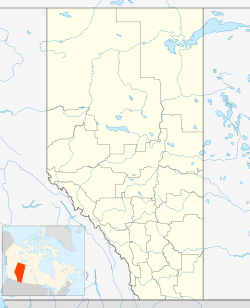Beynon, Alberta facts for kids
Quick facts for kids
Beynon
|
|
|---|---|
|
Unincorporated community
|
|
| Country | Canada |
| Province | Alberta |
| Region | Southern Alberta |
| Municipal district | Kneehill County |
Beynon is a small, unincorporated community located in central Alberta, Canada. It's known for its beautiful natural areas.
Contents
About Beynon
Beynon is a special place in central Alberta, Canada. It's an unincorporated community, which means it's a small settlement without its own local government. Most of Beynon is a private ecological preserve covering over 500 acres. This area is very important for nature.
Why Beynon is Special
Beynon is located in the deeply carved Rosebud River valley. This valley has unique landforms and many different kinds of plants and animals. Because of its special nature, over 400 acres (about 1.6 square kilometers) of Beynon have been permanently protected. This means the land cannot be developed with buildings or roads.
This protection happened because the founding family of Beynon donated the land. They wanted to make sure future generations could see the region's natural beauty. The Nature Conservancy of Canada received this land donation in 1999.
History of Beynon
The story of Beynon began in 1892 when Hugh Hesketh "Beynon" Biggs came to Canada. He moved from India and England to join friends at the Springfield Ranche in the Rosebud River valley. At first, the ranch was just a simple sod roofed log cabin.
Early Settlement and Growth
Soon after arriving, Hugh Biggs started bringing in cattle and building a life. By 1901, a better log home was built. This home was still lived in by a family member in 2006. In 1912, a new rail line was built through the valley. This rail line cut through the Springfield Ranche.
The new rail line needed a water supply tank for steam engines and a place for trains to stop. This stop was named "Beynon" after one of Hugh's names. This is how the small village of Beynon started to grow.
On Hugh's property, a country general store, a blacksmith shop, a school, and a small post office were built. The school and post office were still standing in 2006. Two large grain elevators were also built next to the rail line. Corrals were made for holding cattle before they were transported by train. A 'Section house' was built for the rail line maintenance crews. By the late 1920s, Beynon was a small but busy community.
Changes and Conservation
As cars became more common, people could travel more easily to bigger towns. This meant Beynon's future became uncertain. By the end of the 1940s, it was clear Beynon would not grow into a large town. The general store closed in 1955, and the Beynon School closed in 1949. The post office closed in 1978. Both grain elevators were removed by 1980.
Meanwhile, one of Hugh Beynon Biggs's daughters, Myrtle Agnes Beynon "Bud" Biggs (1912–1998), became a strong supporter of nature. As the Beynon area returned to a more natural state, she began working to create an ecological preserve in 1968. She put up "Ecological Preserve" signs on the Beynon property. She showed others how to use land in a way that protects nature.
The Biggs family members who still lived at the Springfield Ranch house decided to protect their undeveloped land forever. This action was taken to make sure that future generations could see a small example of the region's unique beauty.
Fun Fact
The Beynon Canyon was used as a filming location! It was featured in the cemetery scene from the 1978 movie Superman: The Movie.
Images for kids


